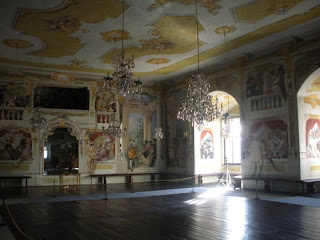After three relaxing days in Krakow, all of the students in my program embarked on a two-hour bus ride to the town of Oświęcim, where Auschwitz is located. Although it is collectively referred to as one concentration camp, Auschwitz is actually composed of three complexes, Auschwitz I (the base camp), Auschwitz II-Birkenau (the extermination camp), and Auschwitz III-Monowitz (a labor camp). In addition to these complexes, Auschwitz also includes 45 satellite camps. During the course of our tour, my classmates and I had the opportunity to see Auschwitz I and Auschwitz II-Birkenau.
Upon our entry into Auschwitz I, I became aware of the weight of anxiety and fear that I would carry with me throughout the remainder of the tour and beyond. I was faced with a level of horror and tragedy that one can scarcely imagine without witnessing it first hand. Although I was surrounded by my classmates, I felt alone. From that point onward, we walked in silence, each absorbing the experience on an intensely personal level.
 |
| View of the main entrance to Auschwitz I--"Arbeit Macht Frei" (Work Makes One Free) |
Prior to becoming a concentration camp, Auschwitz I was the site of 22 prewar brick military barracks which were then turned into the blocks of the camp complex. In 1955, this complex was turned into a museum with a series of exhibitions. During the course of our tour, we were able to see all of the permanent exhibitions, specifically the exhibitions within blocks 4, 5, 6, 7, and 11, with each exhibition focusing on one aspect of Auschwitz, whether the extermination of the prisoners, the daily life of the prisoners, or the conditions in which they lived, to name a few. In addition, we saw the death block, located next to the execution wall, and the interior of the last standing gas chamber.
 |
| View of the execution wall in Auschwitz I |
 |
| View of the interior of the last standing gas chamber in Auschwitz I |
At Auschwitz II-Birkenau, the largest complex, we were able to see the barracks in which the prisoners lived. Seeing these conditions was extremely shocking for me. The barracks in which they lived, along with the bath houses containing communal style restroom facilities were unsanitary to the point of being uninhabitable. Prisoners were filed into these facilities like livestock, with many suffering death solely as a result of prevalent disease and dysentery. For these prisoners, everyday was a new fight for survival.
 |
| View of the interior of one of the prisoner barracks |
 |
| A closer view of the bunk beds in one of the prisoner barracks |
 |
| One of my favorites photos--portraying the contrast between the horror of prisoner life and the beauty of memorialization. |
In addition, we also saw the remains of the four crematoriums located within the compound, as well as the memorial that was built to honor the victims of Auschwitz, along with all of the victims of the Holocaust. Seeing the memorial was an extremely moving experience for me. As I looked around, I saw other visitors placing flowers around the memorial in silence. There were young people, old people, students, Americans, Jews, Germans, Czechs, etc. All of these people came to Auschwitz for their own personal reasons, whether to witness an important part of history, or even to come to terms with a part of their own history. However, what they all had in common was their shared desire to memorialize the unfathomable atrocity that was the Holocaust. To me, this common purpose is extremely profound, for it brings to light the progress that humanity has made since this unforgettable tragedy.
 |
| View of one of the plaques at the Auschwitz Memorial in Auschwitz II-Birkenau |
Every exhibit, building, or memorial that I witnessed during the course of my time at Auschwitz added a new dimension to the overwhelming horror of the camp. Although tears were shed, I don't believe that I fully realized the gravity of what I had seen until days after the experience. Above all, I felt numb. I didn't want to believe that what I was witnessing was real. How could anyone ever commit such atrocities and still be human? What degree of hatred could ever compel one to destroy so many innocent lives? The answers to these questions, among others, will forever evade me.
After looking back at the pictures that I took at Auschwitz, I have come to realize that pictures can never fully portray the depth of emotion that was evoked within me as I walked through the gas chamber, stood within inches of the execution wall, or gazed in somber amazement at unfathomably enormous displays of human hair, prosthetic limbs, and other personal effects of the victims of Auschwitz. Seeing shoes, glasses, toys, suitcases, hairbrushes, and other personal belongings of the victims was perhaps one of the most moving moments for me while touring the camp. At the moment that I laid eyes on them, what I had once read about in books was suddenly given a frightening human quality. At that moment, I truly came to terms with the troubling reality that these victims were far more than mere statistics. Each and every victim had a story, and a life perhaps similar to my own prior to being sent to Auschwitz. These victims were unfortunate bystanders living in the wrong place at the wrong time, and they should never be forgotten.
 |
| View of a pile of eyeglasses collected from prisoners upon their arrival to Auschwitz |
 |
| View of photographs of Auschwitz victims--truly giving a human face to a statistic |
Up Next: Moravia & Vienna
Na Shledanou,
Hannah










































